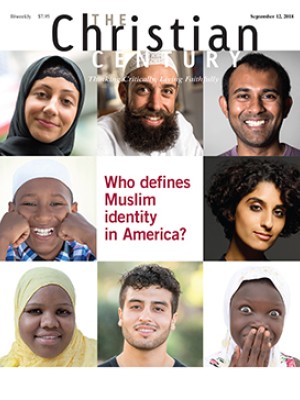Israel’s Druze minority galvanizes opposition to nation-state law
Participation in high-profile mass protest was a departure for the Druze, who are celebrated in Israel for their patriotism and military service.
(The Christian Science Monitor) In decades of demonstrations at Rabin Square, it was an unprecedented sight. With Tel Aviv’s 20-story City Hall lit up in the five-colored Druze Arab flag, tens of thousands of Jewish and Druze demonstrators chanted in Arabic and Hebrew, “Equality. Equality.”
The demonstrations in August opposed Israel’s recently passed nation-state law, a piece of constitutional legislation enshrining the country’s Jewish character that critics say downgrades Arab citizens of Israel, who make up 21 percent of the population, and omits mention of democratic values.
Read our latest issue or browse back issues.
Participation in high-profile mass protest was a departure for the Druze, a small religious minority within the larger Arab minority. The Druze are celebrated in Israel for their patriotism and military service but have strained relations with other Israeli Arabs.
The protest against the nation-state law has put the community in a dramatic new position as leaders in the campaign for equal rights between all Arabs and Jews in Israel.
“I’m happy that we are waving the Druze flag at Rabin Square,” says Aezz Abrukin from the Druze village of Isfiya in northern Israel. “We need to change this law. I’m not political, but we need a law that will protect our rights, like others.”
Abrukin was wearing a shirt with the Jewish Star of David rendered in the colors of the Druze flag. His father was killed serving in Israel’s border patrol.
Titled “Basic Law: Israel as the Nation-State of the Jewish People,” the law has been hailed by supporters like Prime Minister Benjamin Netanyahu as a necessary formalization of the country’s Jewish identity. Detractors say the legislation is unnecessary at best and a nationalist trampling of Israel’s democracy and minority rights at worst.
The Druze, who number about 150,000 out of Israel’s population of nearly 9 million, see the law as an insult to their patriotism and contribution to the country. In the weeks since the law’s passage, two Druze officers publicly resigned from the Israeli military, bemoaning that they had been reduced to second-class citizens.
A group of Druze Israeli parliamentarians were the first to submit a petition to Israel’s highest court against the law, a move followed by other Israeli groups and parties.
“We believe it’s a bad law for all minorities, but specifically for those minorities who see themselves as Israelis,’’ said Amir Khnifess, a recent postdoctoral fellow in political science at Georgetown University who runs a center promoting Druze ties to Israel. He noted that demonstrators sang the Israeli national anthem. “We were united with our Israeli identity, but what we won’t accept is a law that defines us as second-class citizens.”
The cooperation between Israeli Jews and the Druze—who also live in Syria, Lebanon, and Jordan—extends back to before Israel’s establishment in 1948. In recent decades, the Druze have enthusiastically embraced service in combat units, while Druze politicians have been elected to the parliament on the tickets of both right-wing and left-wing Zionist political parties. Their patriotism has kept the Druze at a distance from most Christian and Muslim Arab citizens in Israel.
“The pain of the Druze is genuine and should be respected,” said Ayelet Shaked, the Israeli justice minister, who is part of the far-right Jewish Home party, in an interview with Israeli Army Radio. She nonetheless defended the law and said it shouldn’t be changed.
The Druze say they face the same discrimination as other minorities in civilian life, struggling to get authorization to build in their villages, for example, and suffering discrimination when job hunting.
In an effort to mollify the Druze, Netanyahu offered to invest more government funds in Druze villages and pass a law recognizing the status of minorities who serve in Israeli security forces. At the same time, however, Netanyahu and his political allies alleged that the Druze didn’t understand the law and had been misled by Israeli left-wingers. Druze leaders ultimately rejected the offer.
“They said this has nothing to do with money, this has to do with our Israeli identity,” said Eran Zinger, a Middle East editor at Israel’s public broadcast corporation, Kan. “Their role is to remind Israelis that first Israel is for [all] Israelis, and only then Israel is for the Jews.”
A version of this article appears in the print edition under the title “Israel’s Druze minority galvanizes opposition to nation-state law.’”






